YP Letters: Thin line between eloquence and abuse of our language


I HEARTILY endorse recent letters about the appalling show Mrs Brown’s Boys. The worst thing about it is that it gives swearing a bad name: earthy humour has been with us and other cultures from the times of Chaucer and Rabelais to Catherine Tate today.
However, Mrs Brown doesn’t make me laugh because the bad language is gratuitous, as in the case of many modern stand-up comics.
Advertisement
Hide AdAdvertisement
Hide AdI recall a time when men would rebuke their offending counterparts for swearing in the company of ladies. Go to some pubs or to football matches today and you will hear women as well as men using obscene language, sadly even in front of children. Yet I don’t subscribe to the view that swearing is always a sign of poor communicative skills. Used sparingly, in certain circumstances, an expletive can be eloquent. Habitual swearers, however, can be very amusing without knowing it: I mean when searching for the right word they keep repeating the “f” adjective instead of “er”.
I first became aware of the “acceptability” of swearing in front of ladies in about 1980.
While engaging a pub barmaid, male customers made no attempt to temper their language. The rise of feminism was both justified and inevitable. It is just sad that it
has put paid to chivalry.
From: J Hutchinson, Kirkbymoorside.
HOW I emphasise with ME Wright (The Yorkshire Post, May 18). You only need to switch on your TV to hear inane presenters raising their voices far in excess of the necessary volume, especially on children’s programmes, to realise how widespread the ‘yapoholic’ problem is.
Advertisement
Hide AdAdvertisement
Hide AdInterviews, including those with academics, are often peppered with ‘like’, kinda’,’ sort of’; the list is endless. I find it very disheartening to hear our beautiful language being abused in this manner and wonder if the literate and semi-literate people of this country were ever taught grammar at school.
From: Mr SB Oliver, Churchill Grove, Heckmondwike.
ME Wright’s letter centred around the repeated use of the word ‘like’ which was being spoken, I would assume, by a group of young people. It is another of the verbal afflictions that punctuate conversations today, similar to the repetitive use of ‘you know’.
He wrote that it was used about 60 times between Leeds and Moortown which I think is quite moderate. If he thinks that 60 times during a 20 minute journey is excessive, he should listen to BBC Radio 2’s Jo Whiley programme and the recent interview with the singer Kate Nash.